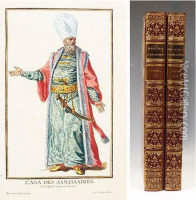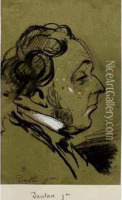Jean-Pierre Le Jeune Dantan Paintings
Jean-Pierre Dantan, known as Dantan the Younger to distinguish him from his older brother, Antoine-Laurent Dantan (Dantan the Elder), was a French sculptor who achieved fame for his caricature busts of prominent personalities of his time. Born on December 28, 1800, in Paris, France, he grew up in an artistic environment which greatly influenced his future career.
Dantan studied at the École des Beaux-Arts in Paris and was a pupil of the renowned sculptor François-Joseph Bosio. He also learned from his brother, who was an accomplished sculptor in his own right. Early in his career, Dantan showed a penchant for satire and wit, which became the hallmark of his work. He began exhibiting at the Paris Salon in 1827.
His work consisted primarily of small parian marble and bronze busts, which were notable for their humorous and exaggerated features, capturing the essence of the individual in a manner akin to a cartoon or caricature. These caricatures often poked fun at the subjects without being malicious. His subjects spanned across various fields, including artists, musicians, politicians, and writers of the time, making his studio a popular attraction.
Dantan's style was unique in that it blended skilled craftsmanship with a humorous portrayal that bordered on the grotesque, yet always remained endearing. His caricatures were a form of social commentary, reflecting the culture and politics of the July Monarchy (1830-1848) and the Second French Empire (1852-1870).
Despite his success with caricatures, Dantan also produced 'serious' works, including statues and portrait busts that demonstrated his versatility and command of the medium. However, it is his satirical busts that have left a lasting legacy, offering insight into the society and personalities of 19th-century France.
Jean-Pierre Dantan died on September 6, 1869, in Baden-Baden, Germany. He is remembered as a unique figure in French sculpture, not only for his artistic talent but also for his sharp wit and ability to capture the spirit of his age through his satirical works.


